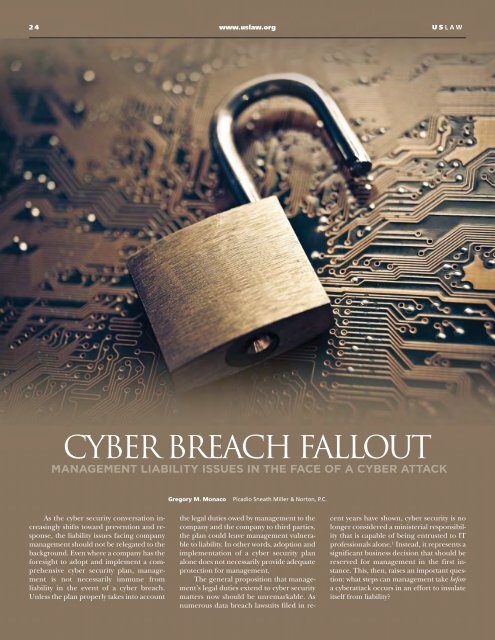CYBER BREACH FALLOUT
2015_Fall_Winter_USLAW-Magazine
2015_Fall_Winter_USLAW-Magazine
You also want an ePaper? Increase the reach of your titles
YUMPU automatically turns print PDFs into web optimized ePapers that Google loves.
2 4 www.uslaw.org U S LAW<br />
<strong>CYBER</strong> <strong>BREACH</strong> <strong>FALLOUT</strong><br />
Gregory M. Monaco<br />
Picadio Sneath Miller & Norton, P.C.<br />
As the cyber security conversation increasingly<br />
shifts toward prevention and response,<br />
the liability issues facing company<br />
management should not be relegated to the<br />
background. Even where a company has the<br />
foresight to adopt and implement a comprehensive<br />
cyber security plan, management<br />
is not necessarily immune from<br />
liability in the event of a cyber breach.<br />
Unless the plan properly takes into account<br />
the legal duties owed by management to the<br />
company and the company to third parties,<br />
the plan could leave management vulnerable<br />
to liability. In other words, adoption and<br />
implementation of a cyber security plan<br />
alone does not necessarily provide adequate<br />
protection for management.<br />
The general proposition that management’s<br />
legal duties extend to cyber security<br />
matters now should be unremarkable. As<br />
numerous data breach lawsuits filed in recent<br />
years have shown, cyber security is no<br />
longer considered a ministerial responsibility<br />
that is capable of being entrusted to IT<br />
professionals alone. 1 Instead, it represents a<br />
significant business decision that should be<br />
reserved for management in the first instance.<br />
This, then, raises an important question:<br />
what steps can management take before<br />
a cyberattack occurs in an effort to insulate<br />
itself from liability?


